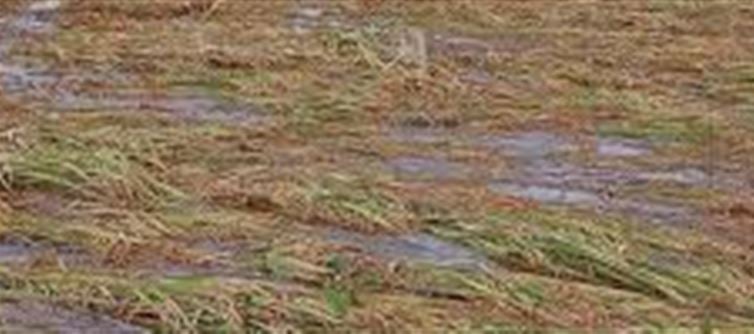
Chennai, Across the fertile Cauvery Delta of tamil Nadu, where paddy cultivation is a way of life, farmers in the districts of Thanjavur, Tiruvarur, Nagapattinam, mayiladuthurai and nearby areas are under mounting stress. Two key problems are colliding: heavy rainfall that has damaged crops, and procurement delays in getting the harvested paddy off their fields and into government storage.
Rain – the first blow
In recent days, persistent and heavy rainfall in low-lying tracts has left large swathes of paddy fields submerged or waterlogged. For example:
- In Nagapattinam, around 2,400 hectares of mature “kuruvai” paddy and about 2,500 hectares of recently transplanted “samba” paddy remain under water.
- In Cuddalore district, in and around Chidambaram, nearly 1,000 acres of paddy fields are waterlogged.
- It was reported that in Thanjavur, of the 79,000 hectares under kuruvai, about 580 ha are affected by waterlogging; in the samba fields, about 100 ha are under water.
This kind of flooding means multiple problems for farmers: destroyed or spoiled crops, inability to harvest on time, and increased moisture in the grain which affects quality and sale-price.
Procurement delays add salt to the wound
Even for those who have managed to harvest, the next hurdle is the government procurement system:
- Procurement of the current kuruvai harvest has lagged badly: in one estimate, of the 70% of crop already harvested, only around 40% has been lifted by the procurement agency.
- Storage and transport bottlenecks: warehouses are already near capacity, labour shortages persist, gunny-bag shortages and transport delays are reported. For example, in procurement for the current season, a target of 9.5 lakh tons was set but available storage was only about 7.5 lakh tons.
- Rain-soaked paddy kept in open piles at Direct Procurement Centres (DPCs) has spoiled: in one case over 2,000 bags were damaged at a DPC in Villupuram after being exposed for 20 + days.
- The issue of moisture content: Normal allowable moisture for procurement is 17%. But with rain and cloudy/damp weather, many grains exceed that limit, risking rejection or lower price. Farmers are urging the government to raise the allowable threshold to ~22% for the delta region.
The combined hardship on farmers
These overlapping issues mean:
- Farmers have already invested in cultivation, expecting returns, but are now seeing crop damage or lower yields.
- The delay in procurement means produce sits in fields or at DPCs, exposed to weather, increasing risk of spoilage or higher moisture.
- When the grain is rejected or reduced in quality/price because of excess moisture, farmers’ incomes drop.
- Many small‐farmers may also face mounting debt, interest costs, and fewer alternatives for off‐take.
What is being done – and what still needs to happen
- The state government and agencies have been directed to speed up procurement, clear backlog at DPCs and warehouses.
- A central team has inspected crop damage and moisture levels in sample districts.
- Farmers are demanding flexibility: allowing higher moisture content for procurement in regions suffering rain, increasing daily targets for procurement, improving drying/storage facilities.
However, key gaps remain: the storage-transport chain is weak, many DPCs still rely on open storage, procurement pace remains behind targets, and weather continues to complicate harvesting and drying.
Looking ahead
If measures are not ramped up quickly, the delta farmers risk not only short‐term losses but also long‐term impacts: reduced capacity to invest in next seasons, erosion of confidence, and increased vulnerability. With the northeast monsoon still active, timely action is critical.
In summary, the twin burden of rain damage and delayed procurement is putting considerable strain on farmers in tamil Nadu’s delta districts. Unless the procurement machinery and support systems are strengthened — with appropriate flexibility for weather‐impacted situations — the season may yield more distress than harvest.
Disclaimer:
The views and opinions expressed in this article are those of the author and do not necessarily reflect the official policy or position of any agency, organization, employer, or company. All information provided is for general informational purposes only. While every effort has been made to ensure accuracy, we make no representations or warranties of any kind, express or implied, about the completeness, reliability, or suitability of the information contained herein. Readers are advised to verify facts and seek professional advice where necessary. Any reliance placed on such information is strictly at the reader’s own risk.




 click and follow Indiaherald WhatsApp channel
click and follow Indiaherald WhatsApp channel